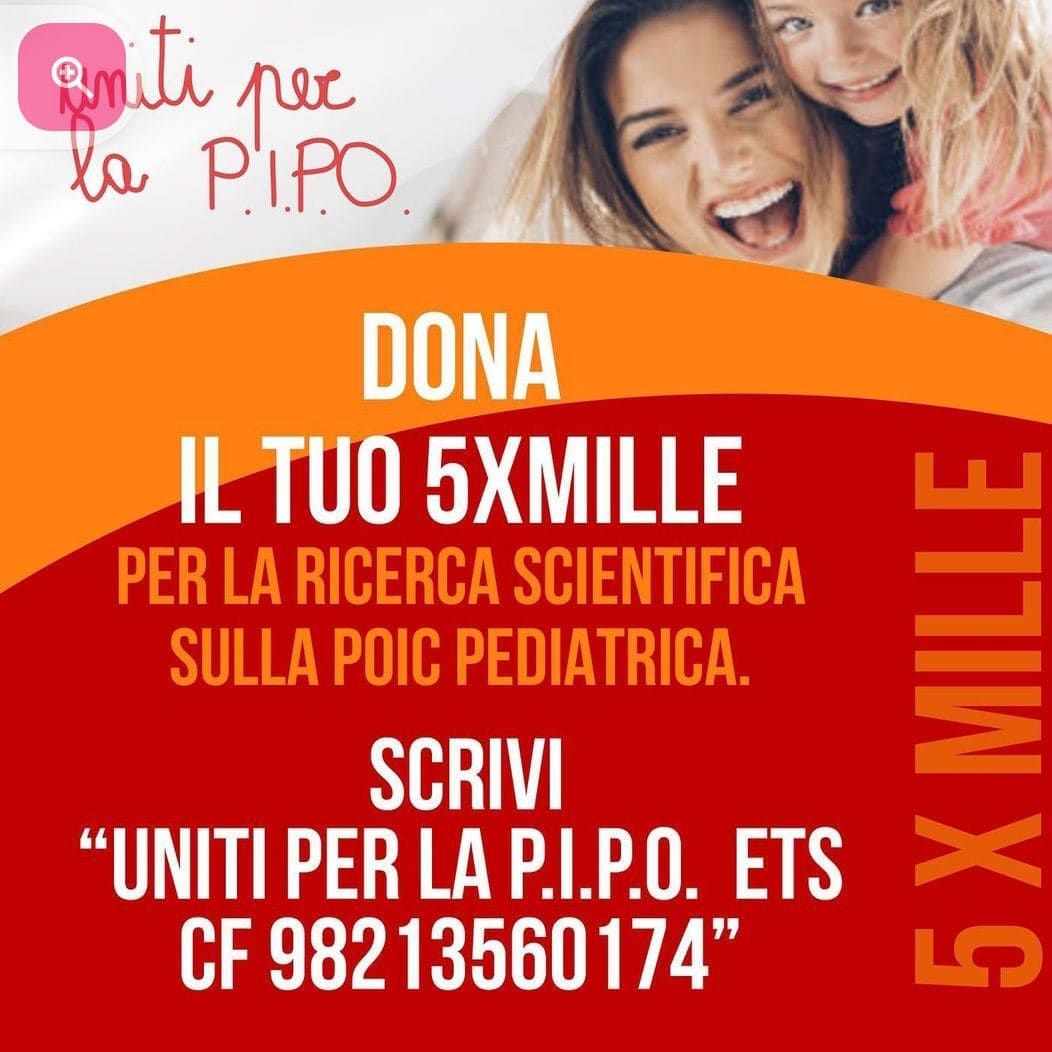Giannina Baldussi
President
gianninabaldussi@gmail.com
Pseudo-Ostruzione Intestinale Cronica (POIC) o
Pseudo-Ostruzione Intestinale Pediatrica (PIPO)
Chronic Intestinal Pseudo-Obstruction (CIPO)
Chronic intestinal pseudo-obstruction (POIC) is a rare disease, which can affect adults and children, characterized by a serious disorder of intestinal motility with alteration of the propulsive capacity of the intestine, i.e. the movements of the bowel muscles that push forward intestinal contents and gas (peristalsis). According to the most recent international guidelines, drawn up in 2018 by the European Society of Gastroenterology, Hepatology and Pediatric Nutrition (ESPGHAN), it is appropriate to distinguish the forms that begin in the pediatric age with the name of Pediatric Pseudo-Intestinal Obstruction (PIPO).
A group of conditions with variable manifestation, in which the digestive system is unable to advance its contents, resulting in symptoms of intestinal obstruction, falls within the definition of Chronic Intestinal Pseudo-Obstruction (POIC) or Pediatric Pseudo-Intestinal Obstruction (PIPO) , even in the absence of a true mechanical obstruction. The result is the partial or total inability to feed by mouth.
What are the causes
The cause of Pediatric Bowel Pseudo-Obstruction is unknown. There are forms due to diseases of the intestinal muscles or nerves (myopathies or neuropathies or mitochondrial diseases). Sometimes the disease occurs as a result of metabolic, endocrine, rheumatological, muscular or neurological disorders.
There is an alteration of the neuromuscular structures of the intestine which is at the basis of the movement alterations, up to the total absence of peristalsis.
The disease can be generalized, i.e. involving the digestive system in its entirety, or localized, involving the small intestine in most cases. In addition, the musculature of other internal organs, such as the bladder, is also sometimes affected.
How it manifests itself
Pediatric intestinal pseudo-obstruction occurs with intestinal obstructive symptoms, even in the absence of a real mechanical obstruction. Common symptoms are:
Bloating and abdominal distension;
Vomit;
Constipation;
The intolerance of food;
The growth retardation.
In fact, in addition to motility, digestive function is also often compromised, with a reduced ability to absorb the different foods we eat. In case of bladder involvement, symptoms of urinary retention are present, with difficulty or inability to urinate.
How do you care
The therapeutic management of Pediatric Bowel Pseudo-Obstruction involves numerous specialists in a multidisciplinary team, which includes pediatricians, gastroenterologists with experience in gastrointestinal motility, digestive surgeons, urologists, specialists in metabolic and genetic diseases, nutritionists and psychologists.
The primary objectives are the treatment of obstructive symptoms and the maintenance of a good nutritional status and a valid growth.
Enteral (intestinal) and parenteral (intravenous) nutrition play a fundamental role in the management of the disease.
There are no specific drugs for the treatment of Pediatric Pseudo-Bowel Obstruction, however some therapies can be used to relieve symptoms and manage complications, such as prokinetics (which promote bowel movements), antiemetics (which reduce nausea and vomiting) and antibiotics ( which hinder the growth of intestinal bacteria).
Surgery plays a crucial role in the management of patients with Pediatric Pseudo-Bowel Obstruction. Digestive ostomies (e.g. gastrostomy, jejunostomy, ileostomy, colostomy) provide direct access to the affected gastrointestinal tract. They can be used for enteral nutrition or drug administration and simultaneously represent a route of decompression from the gastrointestinal content.
Intestinal transplantation represents to date the only definitive treatment for Pediatric Pseudo-Bowel Obstruction. However, in view of the high risk of complications and transplant failure, this strategy is reserved for patients with severe disease, intestinal insufficiency and severe complications resulting from prolonged parenteral nutrition.
Pediatric intestinal pseudo-obstruction is a complex disease that requires personalized management based on the needs of each patient. The presence of a multidisciplinary and highly specialized team is required, in consideration of the complexity of diagnostic methods and assistance programs. The sharing of experiences and skills between national and international experts is the basis for improving daily clinical care and future research perspectives.
Board
Giannina Baldussi
President
gianninabaldussi@gmail.com
Antonio Contessa
Member
avv.contessa@tiscali.it
Scientific technical committee
Dott. Giovanni Boroni
Chirurgo Pediatrico - Azienda Ospedaliera Spedali Civili di Brescia
Dott.ssa Isabella Ceccherini
Responsabile UOSD Laboratorio di Genetica e Genomica delle Malattie Rare - IRCCS Istituto Giannina Gaslini di Genova
Dott. Paolo Gandullia
Responsabile UOC Gastroenterologia pediatrica ed Endoscopia digestiva, IAS endoscopia intervenzionale - IRCCS Istituto Giannina Gaslini di Genova
Emanuele Mazzoleni
Infermiere professionale, assistente alle famiglie con pazienti in N.P. domiciliare; Care transition coordinator / Nutrition unit Baxter Spa Italy
Dott. Alessio Pini Prato
Direttore della Chirurgia Pediatrica dell’Ospedale Infantile dell’Azienda Ospedaliera Santi Antonio e Biagio e Cesare Arrigo di Alessandria
Dott.ssa Federica Viti
Ricercatrice presso l'Istituto di Biofisica del C.N.R. sede di Genova
Dott.ssa Emanuela Chiappalone
Professore associato del Dipartimento di informatica, bioingegneria, robotica e ingegneria dei sistemi presso l’Università di Genova
Dott. Stefano Avanzini
Dirigente medico I livello UOC Chirurgia Pediatrica IRCCS Istituto Giannina Gaslini
If you want to actively participate as an Associate, download and fill out the Form above and send it by email to unitiperlapipo@gmail.com
Brescia (IT)
25124 Via Corfù 78
Telefono:
+390302451093
E-mail: unitiperlapipo@gmail.com
IBAN IT05B0623011202000059000868
NELLA TUA DICHIARAZIONE DEI REDDITI SCRIVI
UNITI PER LA PIPO E.T.S.
C.F. 98213560174
